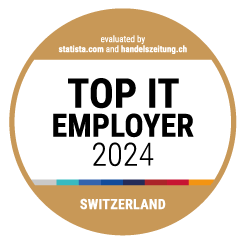Generative Artificial Intelligence (GenAI) is revolutionizing the way companies work, optimizing different business areas and tasks, increasing productivity and revolutionizing processes, e.g., by developing innovative product ideas and improving customer service. FInd out what GenAI is, how generative AI can be used in companies and what the future of generative artificial intelligence looks like.
What is generative artificial intelligence?
The rapid development of artificial intelligence (AI) has led to significant breakthroughs in recent years. One particularly promising technology that is attracting the attention of companies worldwide is generative artificial intelligence. According to the Gartner Hype Cycle™ for Artificial Intelligence 2023, GenAI is dominating current discussions in the field of AI and is causing companies to rethink their business processes and the value of their employees.
What is GenAI? Generative artificial intelligence is a form of artificial intelligence that specializes in creating new content and ideas based on user input. This content can include text, images, videos, and audio content and at first glance is almost indistinguishable from human-generated content. Generative AI uses algorithms to independently generate new data that is similar to that on which it has been trained. In this way, content can be generated without the need for human intervention.
How can GenAI be deployed and used in companies?
GenAI has the potential to turn the world of work on its head. The potential uses of generative artificial intelligence in companies are diverse and range from the automation of work processes to the improvement of customer and employee experiences. Companies use GenAI in areas such as customer service, cybersecurity and fraud management, customer relationship management (CRM), digital personal assistants, product development, content production, product recommendations, accounting, recruitment and talent search.
Where is GenAI already being used today? GenAI is already being used in various areas, such as:
- Product development: GenAI can be used in product development to generate new product ideas or improve existing products, for example. By analyzing customer data and market trends, GenAI can create innovative product concepts based on the needs and wishes of customers.
- Customer service: In customer service, GenAI can be used for automated responses to customer inquiries and personalized recommendations. This can improve customer service efficiency while ensuring a consistent customer experience.
- Automation of business processes: Generative AI can be used to automate various business processes, for example chatbots in customer service or to answer frequently asked questions.
- Operational AI Systems (OAISys): Orchestrating, automating and scaling production-ready AI systems is possible with generative artificial intelligence.
- Predictive analytics: GenAI can be used to predict future trends and support decision-making processes.
- Support for personnel management and recruiting: GenAI is used, for example, to analyze applicant data and identify suitable candidates for vacancies.
- Cybersecurity: Generative artificial intelligence can be used to detect and defend against cyber threats.
- Software programming: GenAI can be used to automate some aspects of software development.
- Content creation: GenAI is used for the automated creation of content. A well-known example of generative artificial intelligence is ChatGPT, a system based on the GPT 3.5 architecture that can generate human-like text. This technology has a significant impact on the productivity of employees, including developers who use ChatGPT to develop code.
What are the advantages of generative AI?
The implementation of GenAI offers companies significant competitive advantages. By automating work processes, improving decision-making processes and creating innovative solutions, companies can increase their efficiency and be better prepared for the challenges of the future.
The benefits of GenAI are manifold and range from optimizing products and services, improving safety and monitoring to speeding up forecasting and analysis.
- Optimization of products and services: Companies can use generative artificial intelligence to optimize products and services, providing consumers with better offers.
- Security and monitoring: The advantage of AI is that it can recognize patterns and thus be used to combat fraudulent activities.
- Forecasting and analysis: AI enables companies to evaluate large amounts of data and make improved forecasts and analyses.
- Efficiency and accuracy: AI technologies enable companies to automate processes and work steps, and thus make workflows more efficient.
What does the future of GenAI look like?
According to Gartner, the following innovations are being driven by GenAI:
- Artificial General Intelligence (AGI): This refers to the intelligence of a machine that can perform any intellectual task that a human can.
- AI engineering: AI engineering is the fundamental discipline for the enterprise-wide deployment of AI solutions on a large scale. AI engineering creates coherent AI-based systems for enterprise development, deployment, and operation.
- Autonomous systems: Autonomous systems are self-managing physical or software systems that perform specific tasks autonomously, learning and acting.
- Data-centric AI: Data-centric AI is an approach that aims to improve and enrich training data in order to achieve better AI results. This discipline also includes data quality, data privacy and scalability.
- Intelligent applications: Intelligent applications use learned adaptations to respond autonomously to humans and machines.
- Prompt engineering: Prompt engineering is concerned with providing input in the form of text or images to generative AI models to specify and narrow down responses.
- Intelligent robots: Intelligent robots are AI-controlled, often mobile machines that can perform one or more physical tasks autonomously.
Gartner sees innovations driving the development of GenAI in the following areas, among others:
- AI simulation: AI simulation is the combined application of AI and simulation technologies to co-develop AI agents and the simulated environments in which they are trained and tested.
- Causal AI: Causal AI identifies and uses cause-and-effect relationships for more effective recommendations for action and more autonomous action by AI systems.
- Multi-agent systems: Multi-agent systems (MAS) are a type of AI system consisting of multiple independent but interactive agents such as AI models, software programs, robots, and other computational entities, each of which is capable of perceiving and acting on its environment.
- Neurosymbolic AI: Neurosymbolic AI is a form of composite AI that combines machine learning methods and symbolic systems to create more robust and trustworthy AI models. It provides a logical infrastructure for solving a wider range of business problems more efficiently.
- Responsible AI: Responsible AI is an umbrella term for aspects that concern appropriate business and ethical decisions when introducing AI. This includes organizational responsibilities and practices that ensure the positive, accountable and ethical development and use of AI.
Generative artificial intelligence is an exciting development in the field of artificial intelligence that has the potential to fundamentally change the way we work and interact. With its diverse applications and benefits, it offers companies the opportunity to optimize processes, improve and personalize products and services, but also to develop innovative solutions based on the individual needs of their customers.
Companies that adopt GenAI at an early stage can not only increase their competitiveness, but also ease the challenges of dealing with AI models in business processes. Investing in generative AI promises to transform the corporate landscape and unlock new potential for innovation and efficiency.










